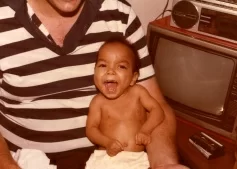 without a thought on my part. But Luke came to my mind yesterday and I looked up some information on him and discovered that his birthday had just passed. I found this old article that I wrote about Luke a few years ago. I thought I'd share it again. I am convinced that there are important and significant lessons we can learn from his life, and that I need to regularly share what I think they are. I hope you enjoy this!
without a thought on my part. But Luke came to my mind yesterday and I looked up some information on him and discovered that his birthday had just passed. I found this old article that I wrote about Luke a few years ago. I thought I'd share it again. I am convinced that there are important and significant lessons we can learn from his life, and that I need to regularly share what I think they are. I hope you enjoy this!The mysteries of God are a part of the Christian life that can often lead to confusion, doubt and even discouragement for believers.
- For some, it's a pride thing. We want to have answers – we want to understand, to be able to grasp the complexities of Biblical truth and God's plan for mankind.
- For some, God's mysteries – the unexplained things of life – are stumbling blocks to faith:
1. Why do bad things happen to good people?
2. Why does He allow pain, suffering and evil to thrive in our world?
Several months ago we were witnesses to the aftermath of the tragedy in Pennsylvania involving the Amish community, where, good, decent, hard working, non violent people were subjected to unspeakable cruelty towards their children. How can this happen?
3. One of our CSC children, who grew up in the worst poverty imaginable in Cebu City, was adopted into a family in the United States several years ago. Well meaning people would tell her how lucky she was and how God obviously had a wonderful plan for her life. She had a hard time with that and would sometimes ask her parents, "But what about all the kids who are still there, who weren't adopted, and who are still suffering and dying? What is God's wonderful plan for their lives? Why me and not them?
For many of us, we celebrate the goodness of God in our lives, we praise him for his healing, for material comforts, for blessing our efforts – even as we observe people who remain sick or disabled, who suffer in poverty – those who efforts and initiatives end in disappointment and ruin.
There are two extremes in terms of people's reactions to the things about God and life that are not understood.
1. There are those who try in vain to grasp the ungraspable – to be able to reduce the mysteries to understandable formulas or explanations. I remember a young seminarian who came to Cebu and who filled the pulpit of our church on a Sunday evening. He preached for an hour on the "peace of God that passes all understanding." Perhaps he felt that if he preached long enough he could crack that nut and open our understanding!
We all know those who have reduced the book of Revelation to precise charts and timetables, giving us easy to understand categories for all of human history and, most especially, the times to come.
2. A second category are those who shake their heads and say, "We'll only know these answers when we get to heaven." They suspend inquiry, not bothering to seek answers to the perplexing questions of life.
Living and working in a Third World country like the Philippines brings some of these mysteries to the front of our lives. Poverty, and all that goes with it, is "in your face." People often ask me "How do you like living in the Philippines?" That's a tough one to answer. Life anywhere has its highs and lows. Some days are great, others are difficult. I often answer this way:
1. When I'm sitting down to a nice breakfast I am aware that, within a few meters of my house are families that have no breakfast.
2. When I'm driving to the office or the Shelter I often pass people walking along the road who, for lack of a few cents can not even afford public transportation and must walk.
3. When I stop to buy medicine for my family or the CSC kids, there are people standing nearby whose children are dying for lack of that very same medicine.
Why am I blessed and they are not?
I recall a conversation with a missionary a few days after Cebu was hit by a strong typhoon. Many of our CSC workers lost their roofs or their entire homes. The houses of the poor were devastated by the high winds and torrential rains. The missionary said that it had been such a miracle how God spared the missionary homes from damage, holding his hands of protection around us during the storm. I remember wondering whether it wasn't more a matter of our having cement houses and strong metal roofs.
Why did our CSC kids have to suffer so much? And how much more, those who live on the street and cannot be admitted to CSC?
These are tough questions. When it comes to trying to understand our own suffering, the Bible gives some answers. For example, Romans 5:3-4 tells us that suffering produces perseverance, perseverance character, and character, hope. And the Bible gives us additional hope that we will someday come to see God's purpose and mysteries:
"But now we see through a glass dimly, but then face to face."
And we hear the testimonies of Christian brothers and sisters who have lived through terrible times and have turned negatives into positives in their lives.
Several months ago I was attending a conference in Bismark, North Dakota. One of the featured speakers was Steve Saint, Steve's father, Nate Saint, was one of the five missionaries killed in 1956 by Aucan warriors in Equador. Steve told about what that tragic day meant to his family, and what it was like when his dad, his hero, didn't come home that day. We saw video of his current family life, and saw a man who was interacting with Steve's children, and who was being referred to as "Uncle." It turns out that this was the very man who had killed Steve's father, who had come to know Jesus and had experienced the forgiveness of God and of the Saint family and now was a part of their family – an amazing story of how good things had come out of tragedy and suffering.
So the clear message is that God has a plan for our lives, we will discover that plan in the right time. He is writing our life's stories, but some of the chapters are difficult ones.
We can understand this. We can, when aided by the Holy Spirit, see how difficulties and suffering are part of a purification process for us, and that we, like Job, will eventually be better people for it.
But what about people who, because of major disabilities, are unable to understand their situation, unable to discern the hand of God or his plan for their lives. Where is the purification and growth and ultimate value for these people? What could God's purpose possibly be?
Back on 1982 a baby was born in a charity ward in a small hospital in Cebu City. 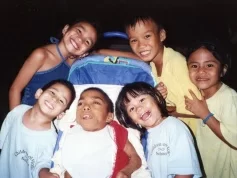 The baby underwent cardiac arrest during birth and was without oxygen for an extended time. Unlike many cases of charity patients, the hospital staff decided to resuscitate the baby, even after he had suffered massive brain damage and cerebral palsy. The baby's mother abandoned him in the hospital, and after a couple months Luke was referred to CSC. When we took him in he appeared to be a bouncing baby boy. We did not know that he would not develop physically beyond about a year and a half, or mentally beyond a few months. Luke would never speak, nor have voluntary movement of his arms or legs.
The baby underwent cardiac arrest during birth and was without oxygen for an extended time. Unlike many cases of charity patients, the hospital staff decided to resuscitate the baby, even after he had suffered massive brain damage and cerebral palsy. The baby's mother abandoned him in the hospital, and after a couple months Luke was referred to CSC. When we took him in he appeared to be a bouncing baby boy. We did not know that he would not develop physically beyond about a year and a half, or mentally beyond a few months. Luke would never speak, nor have voluntary movement of his arms or legs.
Luke became a fixture at CSC. For over 23 years he was an integral part of our lives and a symbol of CSC and what we are all about.
Many times Luke would be hospitalized – often due to upper respiratory infections. He fought for his life many times. There were at least a dozen times when we were sure that he would die. The doctors had told us that he wouldn't make it past five years old. Then they revised it to nine, then 11 – certainly he wouldn't reach his teenage years.
One time, when Luke was critically ill our staff met to pray and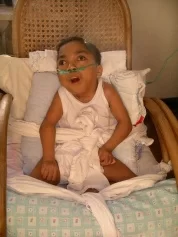 I asked them to reflect on his life. Here is why: I believe that God had a purpose for Luke's life when he created him. I believe that He uses people like Luke to teach us important things. But here is the rub: If we don't spend time reflecting on these lessons, then Luke's life is useless. Its up to us to allow God to make sense of Luke's life.
I asked them to reflect on his life. Here is why: I believe that God had a purpose for Luke's life when he created him. I believe that He uses people like Luke to teach us important things. But here is the rub: If we don't spend time reflecting on these lessons, then Luke's life is useless. Its up to us to allow God to make sense of Luke's life.
And what are the lessons that we found? What has God taught us through his life?
1. First, life is precious. Even though he had nothing to live for, from the world's point of view, Luke clung to live almost ferociously. Some of us who have much more to live for take life casually, we take life for granted. Not Luke. Every day was a struggle. Every breath had to be fought for. Life is a gift from God and we should treat it carefully.
2. God has provided us with opportunities, through Luke's life, to minister to him in significant and life-saving ways. He has provided an avenue for us to live out the biblical mandate to minister unto the "least of these," because, truly, Luke was in that category. Hundreds of people have been given a blessing to participate in the support of CSC that reaches out to children like Luke and many others with other special needs.
3. In so doing, He has given us a chance to show others a Godly value system that doesn't reserve love and attention for those who have something to give back, or who have "potential" or a bright future. For many people who live in a developing country, where resources are limited, this has been a difficult lesson to learn. How could we justify spending so much money for Luke's hospitalization when other, "normal" kids needed care? Luke's life gave us the opportunity to teach about the value of life and about how God looks at all of us.
4. Luke has been a tremendous ambassador for CSC. People around the world remember observing the loving care that he received by our staff and workers. They remember his famous smiles. They may quickly forget the names of the staff or other children, but they remember Luke. "How's Luke doing?" we get asked wherever we go to talk about the ministry of CSC. And our care of Luke helps us explain the true nature and core values of our work in the Philippines.
5. Luke has been a safety valve for those that had an opportunity to know him. My job as Field Director of CSC involves lots of administrative chores, like making budgets, government relations and various kinds of problem solving. There are days when I get stressed out and start to feel the weight of the world on my shoulders. But all I needed to do is to drive a few short miles to where Luke lived, to hold him in my arms, and I get a clear picture of what real struggles are all about. My struggles paled in comparison to what Luke faced every day. Self pity may be easy for some people, but those that knew Luke have no excuse for feeling sorry for themselves. What a great gift that was to all of us.
A little over a week before we left Cebu, Marlys called me on my cell phone and told me that I should get to the hospital quickly, as Luke wasn't doing well. He had been hospitalized for over a week and his breathing was bad. I had gotten messages similar to this one throughout Luke's life, so I went to the office and took care of a few things. But the Lord laid it on my heart to go see Luke and when I entered his room his breathing was extremely labored. He looked different than I had ever seen him, and it became clear that he was dying. I sat down next to him, kissed him and looked into his eyes. For 23 years we had loved this boy. It wasn't easy to say goodbye. I said to him, "Luke. You can go. Go to be with Jesus, Luke. I love you." Within a couple of minutes Luke took his last breath. 23 years of pain, suffering, limitations, hospitalizations, forced breathing, skin rashes and infections were over. We would never see Luke's smile again.
As Luke was dying in that hospital room, I made a promise. I'm not sure if I was making a promise to Luke, to God or to myself. But I decided then and there that I was going to talk about Luke on our coming furlough. I believed then and do now, that the church of Jesus Christ needs to hear about Luke, that the lessons of his life are important ones. Many Americans are complainers - full of self pity. People who have so many material comforts are unsatisfied. American discourse is increasingly a chorus of victim and entitlement claims. Charles Sykes, in his book "A Nation of Victims: The Decay of the American Character" states that, "in a nation where everyone is a victim, no one is a victim." In our preoccupation with our own needs we have a hard time seeing the needs of others – people like Luke.
In his song "God Help the Outcasts," the Hunchback of Notre Dame poses several difficult issues:
I don't know if there's a reason
Why some are blessed, some not
Why the few You seem to favor
They fear us, flee us,
Try not to see us.
The first part we have already examined. The second is our call to arms. "Why the few You seem to favor, they fear us, flee us, try not to see us."
I don't know what factors might make it difficult for us to see the needs of society's outcasts. Perhaps we are too busy. Maybe our personal and church calendars are so full that there just isn't room for Luke, or the man who had fallen to thieves at the side of the road, to break into our day. Maybe we are numbed or fatigued by the needs of others, or simply overwhelmed by the circumstances of our own lives. Maybe we have become cynical. "Why did that guy travel this road at this time carrying that amount of money? He deserves what he got!"
Maybe, just maybe, Luke can help cut through the apathy, the self-centeredness and cynicism of our lives. He was a person with significant needs that he didn't cause. He was totally dependent on others to live. His life had none of the possibilities and opportunities that we take for granted every day. He needed us so very much. Maybe Luke can serve as a symbol of many others that we come into contact with. Maybe Luke can help us rescue our lives.
Math is their favorite subject!
At exactly 10:15 the kids are suddenly all excited. Why? It’s time for math, their favorite subject. The kids are eager to start a new lesson on time. We start the discussion and I ask them questions to spark interest. “What is time?” “Why do you think time is important to us?” “Why do we need to use our time wisely?”
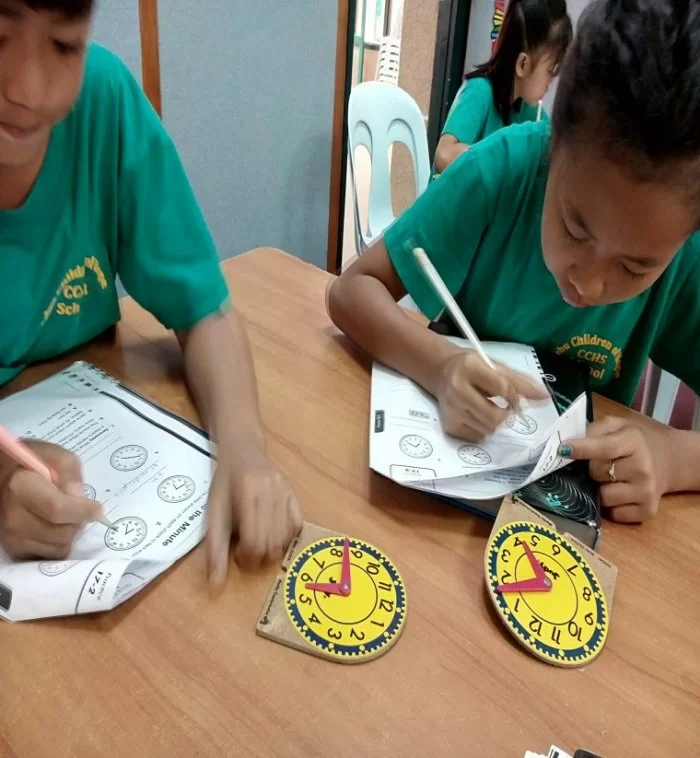
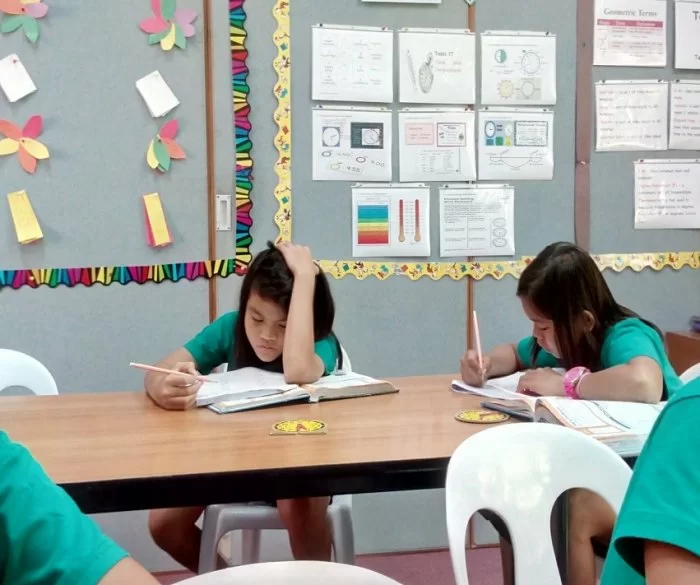
The kids come up with thoughtful answers. One student replies, “We only have one chance to live, Teacher. All things are just passing by. That’s why we need to use our time wisely.” I am really happy to hear this type of answer. It shows they are thinking that things are important and have different purposes.
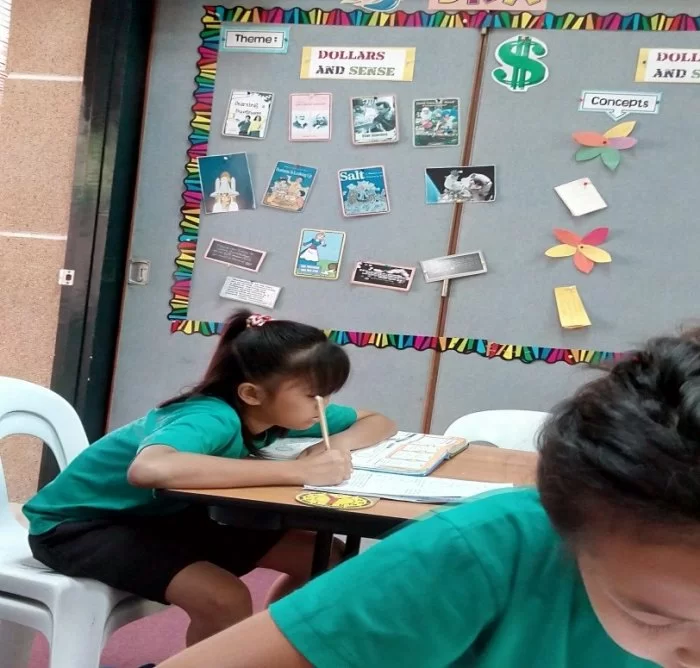
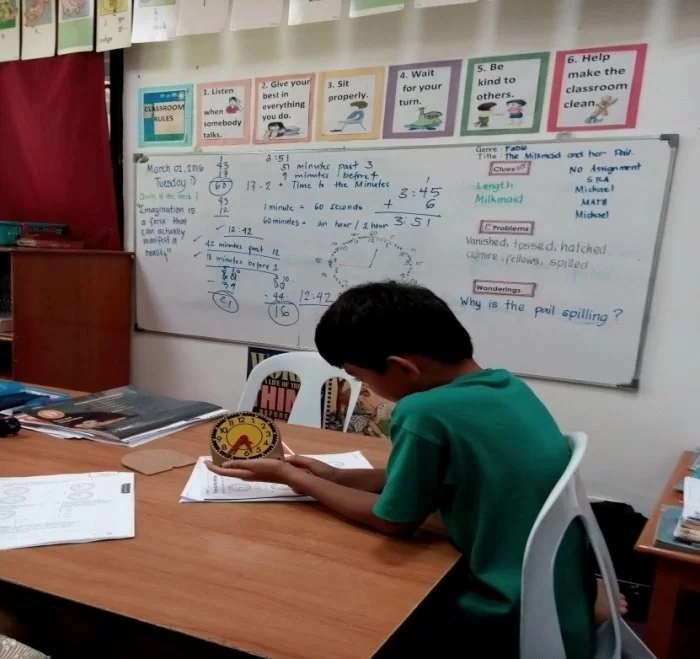
Everyone actively participates in the discussion. They are excited to use small clocks as a manipulative tool while they answer some time questions as a group. They are now ready to try the short informal assessment on their own.
“To be in your children’s memories tomorrow, you have to be in their lives today.” These words are running through my mind right after the activity. It’s sort of related to our topic about time. My time with the students is never wasted. It is a blessing given by God. I will forever treasure this journey as one of the significant events in my first year of teaching.
Don't count anybody out
 CSC kids have overcome huge odds to get where they are today. Never count them out. Our children include a girl who suffered burns over much of her body, including her hands, but who is amazing everyone with her dexterity, her dogged determination and her zest for life. We have a boy who had multiple major surgeries including brain surgery, before he was a year old. Today he is running around the house, impressing everyone with his ability to communicate and to run around the playground with the kids his age. We have a girl who came to us as a malnourished baby who was way behind developmentally, and who the doctors told us would probably never walk. She is walking. Very well, thank you. We have a boy who was badly abused and didn't have the self confidence to speak, much less be able to learn or join in activities at school. Now he is participating in school plays, is learning to communicate with adults and his peers, and was recently able to join the other big kids at camp.
CSC kids have overcome huge odds to get where they are today. Never count them out. Our children include a girl who suffered burns over much of her body, including her hands, but who is amazing everyone with her dexterity, her dogged determination and her zest for life. We have a boy who had multiple major surgeries including brain surgery, before he was a year old. Today he is running around the house, impressing everyone with his ability to communicate and to run around the playground with the kids his age. We have a girl who came to us as a malnourished baby who was way behind developmentally, and who the doctors told us would probably never walk. She is walking. Very well, thank you. We have a boy who was badly abused and didn't have the self confidence to speak, much less be able to learn or join in activities at school. Now he is participating in school plays, is learning to communicate with adults and his peers, and was recently able to join the other big kids at camp.
No, never count any of our kids out. In fact, we should never give up on anybody. With a loving, healing God, and people like our therapists, nurses, houseparents, teachers and staff, there is always hope.CSC is all about hope.
We Won!!!
Last October we entered the Support Give-Away Contest for Resource Mate, the library automation program we use at Cebu Children of Hope School. It doesn't sound too glamorous, but we thought it would be worth it to submit the required essay to see if we could win a year of free tech support. The essay had to describe how Resource Mate helps impact our community. Well, we just found out we won the contest!!! Woo Hoo!!!
Here's the essay we submitted:
It’s library day and Eugene wants to check out the next book in the Ranger’s Apprentice series. He looks at the spine label and heads to the “Fla” part of the Fiction section. Juliet wants to check out a Clifford book. She read one in her class and is excited there are more books about Clifford. I help her look in the Easy section and we hunt for the spine labels that have “Bri.” Mary Grace is ready to tackle chapter books and wants to know where to look for ones for girls. I point her in the direction of the Fiction section of books with spine labels that read “Ame” for American Girl books. Maybe she’d like to try a Junie B. Jones book too. The Level B reading class is studying about camouflage. A bunch of the kids ask where to find books about animals that use camouflage. We brainstorm about how to do that and someone remembers that we should search on the Resource Mate computer using the keyword camouflage. The Reading Challenge contest is in full swing. Kids race into the library each day to return their books and check out a new stack to read at home. Teacher Amanda comes into the library looking for books on the theme of risks and consequences. She searches and finds a number of books she can check out and keep in the classroom for the kids to read while they are working on this topic. Teacher Alfie stops in right before leaving for the day to check out some books to read to his girls at home. Sounds like a pretty normal day in the life of a library.
But the library at Cebu Children of Hope School is anything but normal or typical in this city of 866,000 people with one public library. Our library serves the community of children who reside at Children’s Shelter of Cebu, an orphanage in Cebu City, Philippines and the staff who work with the children. All of the children who come to live at Children’s Shelter of Cebu are from the surrounding communities on the island of Cebu or neighboring islands. The vast majority of the children have either never attended school or have attended very little. When the children start attending school at Children of Hope School, they often do not know the letters of the alphabet much less how to read. Usually it is safe to say no one has ever had a book read to them. Needless to say, they have never seen a library.
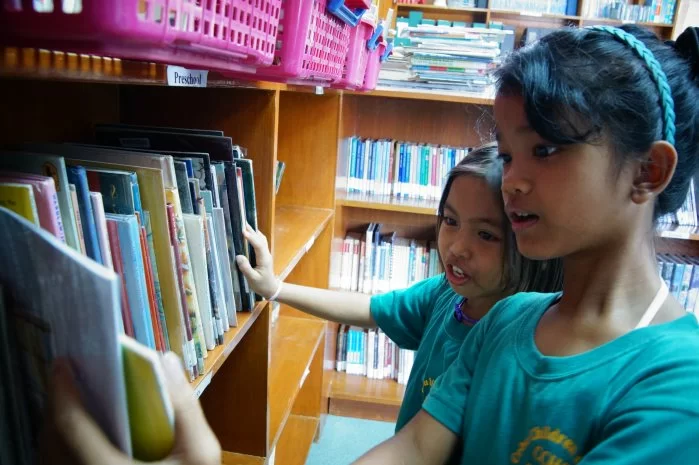 The children are thrilled to learn what a
library is. No one has to convince them
how cool it is to browse the shelves of books and check out books to take home
to the shelter. Teachers have also often
never been inside a proper library. To
have an automated system and thousands of books at their fingertips is pretty
unbelievable. The children and teachers
are taught how to look for books in the library. They learn what spine labels and bar codes
are and how the books are organized on the shelves. They are taught how to search for books by
title, author, subject, or keyword. The
children hover around the Resource Mate computer in the library eager to have
their books scanned so they can start reading their selections.
The children are thrilled to learn what a
library is. No one has to convince them
how cool it is to browse the shelves of books and check out books to take home
to the shelter. Teachers have also often
never been inside a proper library. To
have an automated system and thousands of books at their fingertips is pretty
unbelievable. The children and teachers
are taught how to look for books in the library. They learn what spine labels and bar codes
are and how the books are organized on the shelves. They are taught how to search for books by
title, author, subject, or keyword. The
children hover around the Resource Mate computer in the library eager to have
their books scanned so they can start reading their selections.
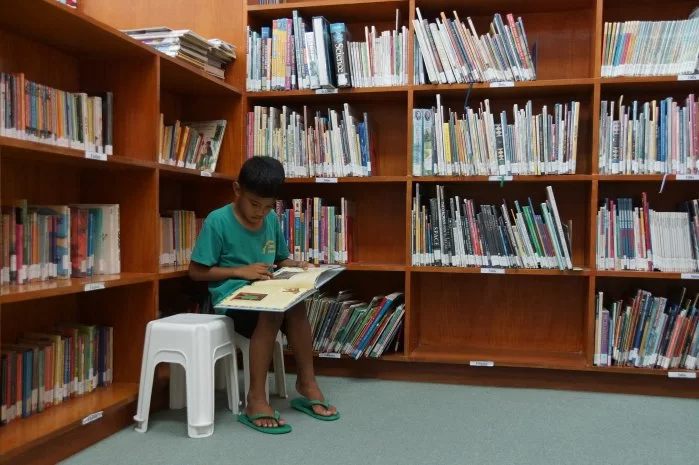 Most of the children who come through the doors
of the shelter and school are adopted either locally or internationally. Currently the children have been adopted into
families in fourteen different countries around the world. The experience and knowledge gained at our
school and in our library goes with them to their new countries, communities,
and families.
Most of the children who come through the doors
of the shelter and school are adopted either locally or internationally. Currently the children have been adopted into
families in fourteen different countries around the world. The experience and knowledge gained at our
school and in our library goes with them to their new countries, communities,
and families.
On the surface, the little library at Cebu Children of Hope School seems pretty normal, but every day really is a little bit miraculous in our slice of the world on the tiny island of Cebu in the Pacific Ocean.
Science, Science, Science!!!
“Its not about what the teacher covers; its about what the students discover”.
The month of February at CCHS is not only Love Month but also Science and Math Month. As a part of our science activities, we went on a science field trip last week to the University of the Philippines’ traveling Science Exhibit. The kids enjoyed trying the various inventions and technology presented at different stations. They were eager and curious as they roamed around the large room.
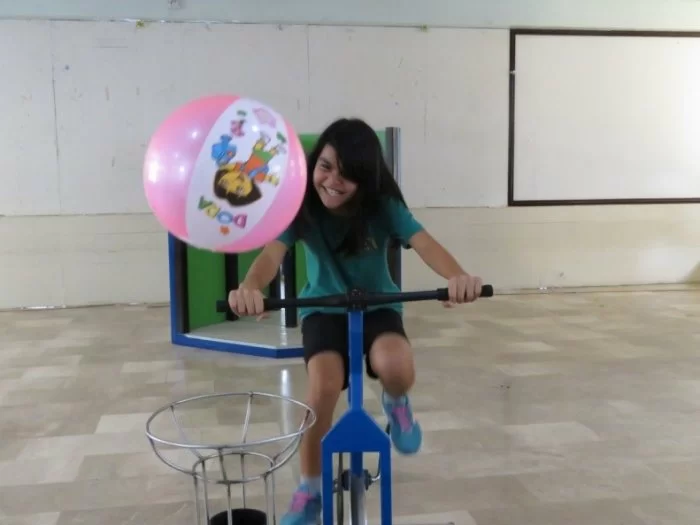
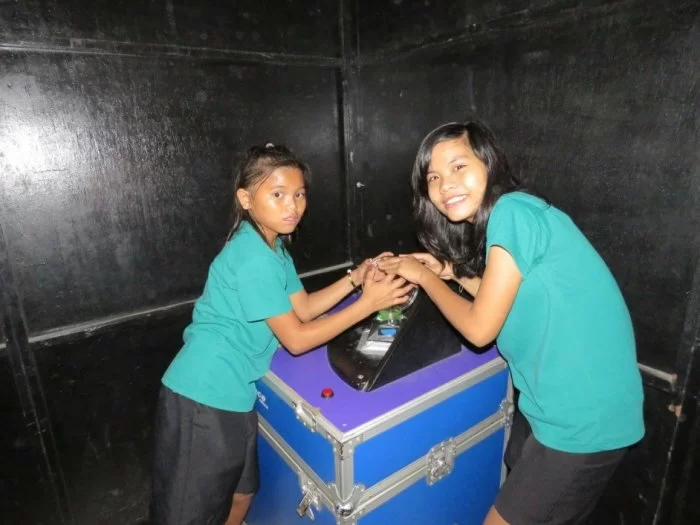
One of the children led me to one of the booths. He told me to touch a small piece of gold colored metal. Suddenly I felt like I was being electrocuted! Then the student said, “See, Teacher, the feeling is so weird!” He called some of his friends over to try the experiment with him. They held hands while the one of them touched the metal. They all laughed when they each felt the current pass down the line through their bodies.
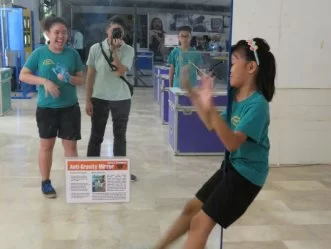
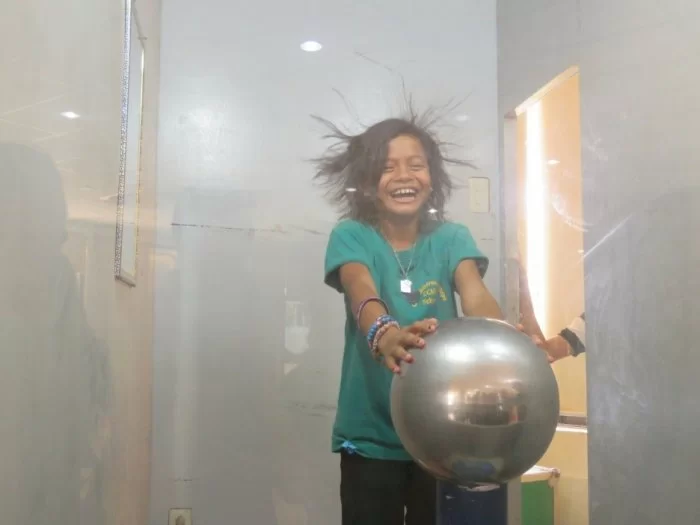
Hands-on learning is important. It motivates children to be more curious about the things around them.
On their coattails
Amy mentioned the other day that our kids were bursting at the seams to start the biannual camp, put on by one of our most faithful supporting churches. I happen to be friends on Facebook with a couple of the team members, and it's fun to see their pictures from Cebu City.
It struck me as I was looking at a few of these pictures that for some of the team members this is the trip of a lifetime. They're nearly 10,000 miles from home, on the other side of the globe, on a small tropical island that is very different from "back home" in Minnesota. Around every corner they see something new, witnessing a way of life that is at times completely different from the ones they lead.
I have no doubt each of them would say they got to participate in something incredible--that they were able to sacrifice a little--because others had sacrificed a lot. We are built on those sacrfices in this work, and we stand on their coattails. I think of the house parents who raised their own family surrounded by a larger family of kids they were surrogate parents to. I think of the missionaries who started our work, and others who continue our ministry far from home. I think of our Education Director who travels for long stints to do her job. Each of them make CSC possible, and make CSC better.
I often observe that the greatest relational question we ask of someone is, "can I count on you?" We want to know, when push comes to shove, if someone will really be there for us. CSC counts on some amazing people. I thank God our employees do what they do, and honor his call on their lives.





